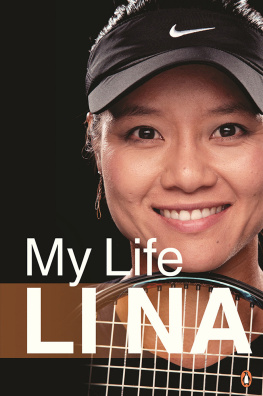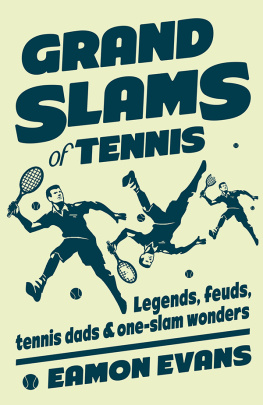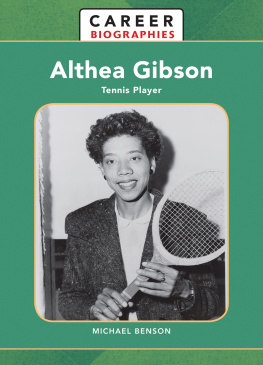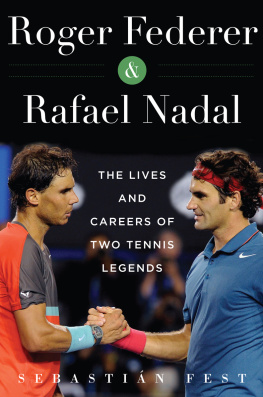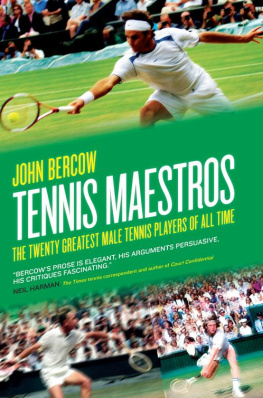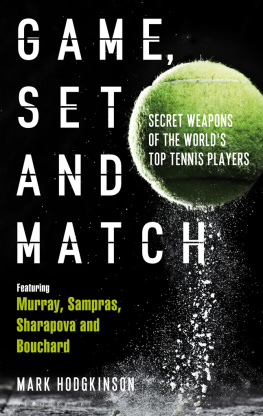Li Na was born in Wuhan, China, and started playing tennis at seven years old. She joined the national team at fourteen and turned professional two years later. She left the national team in 2008 to pursue an independent career, becoming one of the first Chinese athletes to do so. In June 2011, Li Na won the French Open and became the first tennis player representing an Asian country to win a Grand Slam singles title. She continues to dominate professional womens tennis and consistently ranks within the top ten.
Chapter 1
Morning in Paris
As a professional tennis player, I spend most of each year globetrotting. In January, I travel with my team to Australia to compete in the Sydney International and the Australian Open. The Australian Open, one of the worlds four Grand Slams, boasts a long history, but its still the youngest of the Grand Slams. It lasts for about two weeks and is the first Grand Slam of the year.
In February, I usually hang out in Dubai and Doha, where there are two relatively large tournaments. I can adapt to the time change within a week. Then I fly to the US to take part in a pair of events in Indian Wells and Miami. Once thats over, its April. I take a couple of weeks at this juncture to get adjusted to clay courts. During the clay-court season, I travel to Stuttgart, Rome, Madrid and Paris. As soon as this season comes to a close, competition on grass begins, and you know what that means: the Wimbledon championships in late June. Wimbledon is the oldest and most prestigious Grand Slam, but also the only one thats played on grass. When Wimbledon winds up, I might take two or three weeks to regroup for a trip to the US where I compete in a few tournaments, culminating in the US Open in late August. When thats done, I finally have a couple of weeks to unwind. Afterward, I fly to Japan, where I play in Tokyo, then travel on to Beijing. When Womens Tennis Association competition ends in Beijing, the worlds top eight players will be determined. This is how I spend each year.
It sounds exciting, doesnt it? All of the worlds well-known cities, and the worlds top players. But in reality, I havent even been to the most famous attractions in most of these cities. From the airport, Im whisked to the hotel. I spend all of my time each day training and competing, only to be taken straight back to the hotel to rest. After the match, I usually take the earliest flight possible, returning to my base to train, or travelling on to the venue of the next competition. The hotel rooms always the same, no matter how much the designer has tried to transform each one into something unique. Somehow, theres a sort of coldness built into the structure of a hotel room that leaves you feeling detached.
When I awake in the morning, I often spend several entranced moments wondering exactly where I am. Miami or Madrid? Or perhaps Paris?
I glance at various spots in the room Jiang Shan is still asleep, my gown for the French Open is on a clothes rack, bags large and small are in a heap on the floor next to the TV. I rub my eyes. Yes, that is the Suzanne Lenglen Cup standing beside the television: the lifelong dream of all female professional tennis players.
So, today Im in Paris, and my impressions of the previous night arent just some fleeting fantasy. I close my eyes. The images are still fresh in my memory: the applause, cheering, the referees face filled with an encouraging smile. My team, wearing custom-made yellow T-shirts, sits on the sideline. The womens faces are all covered in tears. In the locker room after Id won, Francesca Schiavone smiled and told me, Enjoy your time. Was it really more than just a dream?
Jiang Shan wakes up. Hes always been faster to reach the fully awake state than me. I ask softly, Its not a dream?
Of course not! He embraces me. Youre the best!
Im a little embarrassed by his rare statement of direct praise. But his comment makes me feel warm all over.
Yes, this is Paris. Today is 5 June 2011, and yesterday at the Roland Garros Stadium I became the French Open womens singles champion.
To be honest, until this morning, I was more or less in a daze. I still couldnt take in that Id really won the championship.
In 1998, when I was an idealistic sixteen-year-old girl, a television station in Beijing interviewed me and asked what my biggest dream was. Standing in front of the camera, I tilted my sun-darkened face to the lens and said, My biggest dream? I hope I can be a top ten tennis player. I know its extremely difficult, but Ill work hard. God knows how much courage it took for me to make that statement back then. But now, I wish I could say one thing to that little girl: Hey! We made it!
I was told that I was the first Asian woman to win a Grand Slam singles title. My world ranking leapt from seventh to fourth, surpassing Japans Kimiko Date-Krumm to become the highest seeded woman in Asia. As I smiled and received everyones congratulations, my mind was a blank. I knew that Id won, but winning a championship should have felt better than this. When Id lain on that clay surface after winning, I did feel a huge sense of accomplishment, but when the reporters swarmed me, I had nothing to say. They all said my performance was too calm, but in fact, I had no clear idea of the glory and honour attached to a Grand Slam title. Up to this point, it didnt feel so different from any of the other four championship titles Id previously won. It seemed to me that the only difference lay in the prize money and media attention.
There were so many emotions flooding over me. I cannot describe the joy, the great relief, or even the feeling that Id finally bought myself some breathing space with the media. I knew I would no longer see articles in print that referred to me merely as a bad-tempered, stubborn girl from Wuhan. Now I would at least be called a bad-tempered, stubborn girl from Wuhan who was a damn good tennis player.
But this wasnt the most important thing. To me, the greatest gift that victory brought was peace of mind. After the match, I didnt need to cover my face with a towel or hide in the locker room or bathroom while I wept. I would no longer need to hate myself for every little mistake. I would not have to continue torturing myself. I knew that my performance was passable. My internal referee would let me off the hook, for once.
Li Na, this time youve done all right, I said quietly to myself.
To my team and my agent, however, my victory clearly meant something else entirely. Over the next few days, my travel schedule was packed. The day before, Id accepted an invitation to be interviewed by CNN, and in addition, this morning at ten a.m. I was to be interviewed by Sinas reporters for all the viewers back home. I jumped up and began my first day as the French Open champion.
The Sina reporters told me that during my match with Schiavone, a record number of Chinese viewers had watched the live televised event about 116 million of them. So many? It seemed that tennis was slowly creeping into the lives of the Chinese public.
After the interview, I returned to the hotel for a little downtime, then headed out to the Champs-Elyses to do some promotion for my sponsor, Nike. One of Nikes staff, whos also an old friend of mine, Shi Ling, sat in the car with me, chatting as we drove along the Champs-Elyses. When the car reached the Nike Store, I could see nothing but the forms of the four hulking bodyguards who surrounded the car. I felt this was a little excessive. Im just a tennis player after all.
But when the car door opened, I understood. Shi Ling was afraid wed be crushed in the throng waiting at the stores entrance. She told me to wait a moment, then take her hand and wed walk into the store together.
I nodded and then followed her into the store. There was a huge poster on display in the most prominent position. It was large enough to command the attention of everyone who entered. The face on the poster was mine, and the slogan below the image read, Movement changes everything!

